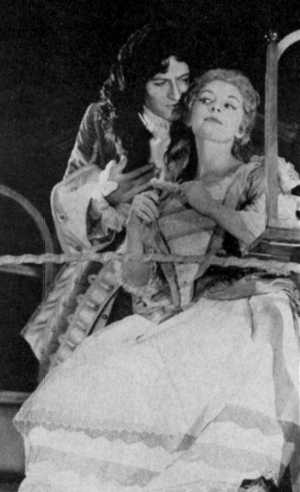Virtue In Danger
Musical Relapse
|
About half of Virtue in Danger is very good; unfortunately it
is the half that Paul Dehn and James Bernard, the devisers of the entertainment
in its present form, had nothing to do with. Actually the whole idea of turning
Vanbrugh's The Relapse into a cosy little musical is faintly mystifying,
except for the obvious hope on the part of the Mermaid's management that such a
work would automatically repeat the popular success of Lock Up Your
Daughters. This for all I know it may do - the formula is not exactly
demanding - but in this case the success will be considerably less well
deserved, for the simple reason that the imported elements are so evidently
inferior, the original which is being tinkered with is so evidently superior,
and the two sides of the show fit so much more awkwardly together.
Of course this sort of thing can only fairly be
judged without rigid preconceptions about what is and what isn't permissible.
There is no need, for example, to get too worked up about desecration of a
classic: The Relapse is a classic of our comedy, but as written it is a
ramshackle, almost unplayable classic. Its length is forbidding (uncut it would
probably run for nearly four hours) and its two plots have only the slightest,
most formal links, mainly in the brief incursions of Lord Foppington, the
principal character of the farcical plot, into the romantic comedy of Loveless,
Amanda, Berinthia and Worthy. |

|
Sheridan rewrote it in more genteel terms as A
Trip to Scarborough in 1777; later revivals cut out the romantic plot
altogether and concentrated on the broad but altogether less shocking and
cynical farce. By such standards Paul Dehn's adaptation, which keeps at least
the outlines of both plots and does not indulge in any of the obvious
bowdlerisations, has quite a bit to commend it.
No, where the objections come in this case are not so
much on principle as on the precise way it all works out in practice. Given
that to fit in with the Mermaid's twice-nightly policy the play has anyway to
be cut by about half, to a bare two hours with interval, it seems on the face
of it wanton to truncate it still further in order to fit in songs. Mr Dehn
offers some attempted justification in his programme-note by suggesting that in
this way he can work in more of the plot more succinctly, using songs to
forward the plot and at the same time create mood and atmosphere. This would be
all very well if it were true, but alas it is not. Occasionally something
happens during a song (the arrival of Lord Foppington at Sir Tunbelly Clumsy's
country house; the final and to all appearances quite arbitrary reconciliation
of Loveless and his wife) but more often than not they are simply interruptions
in the action, taking a single line from the original dialogue - 'Fortune, thou
art a bitch', 'Stand back old Sodom', 'Hoyden hath charms' - and elaborating it
for three or four minutes before the plot can take up where it left
off.
Worse, the songs themselves do nothing to reconcile
one to these intrusions. James Bernard is content, for the most part, merely to
cover the words with painfully banal, four-square melodies which never take
wings on their own and tend to stress Mr Dehn's great weakness as a
lyric-writer, a lack of fluency in rhyming, by coming down plonk on every
rhyme-word. To be fair, there is one exception to this, 'Wait a Little Longer,
Lover', which suggests how the show might have worked as a musical, but it is
only a short-lived hint in an otherwise barren waste.
What are we left with, then? Well, quite a bit, as a
matter of fact. Although Wendy Toye's production, full of the simpering,
posturing and sniggering which usually stand in for style and sophistication in
Restoration revivals, does all it can to obscure things, the cast is excellent,
and whenever it is allowed to captures admirably the true Vanbrugh flavour.
Outstanding in all departments - she even makes something of her songs - is
Patricia Routledge as Berinthia, the merry widow in search of diversion; she is
one of our most stylish comediennes, up to now shamefully under-used, and it
really is time she was allowed a stab at one of the classical comedy roles -
what a Lady Bracknell she will one day make! Equally good are Patsy Byrne, the
perfect Miss Hoyden, even to the touch of genuine feeling which humanises the
farce, and John Moffatt, giving the performance of his career as Lord
Foppington. In lesser roles Gwen Nelson as Hoyden's Nurse and Richard
Wordsworth as the omni-lecherous marriage broker Coupler are brilliant comic
creations, and practically everyone else does what he or she can with the
vestiges of roles left to them.
In fact, this could be a first-rate revival if it
weren't for that wretched music. I suppose it is too much to hope that if - or
when - the show transfers to the West End its devisers will use the additional
running time to put back more of the play and drop the songs, though that would
be the ideal solution. So instead let us hope that when the National Theatre
gets round to Restoration comedy its directors will remember the talents
revealed by this production and allow them to be exercised in a worthier
setting.
John Russell Taylor
Plays and Players, June 1963.
Back to Reviews
page.
